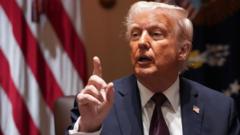US President Donald Trump has announced a significant 25% tariff on imported cars effective April 2, which he claims will bolster the American automotive market and create jobs. However, industry analysts warn of potential disruption, price hikes, and strained relationships with key trading partners.
Trump Implements 25% Tariffs on Car Imports to the US

Trump Implements 25% Tariffs on Car Imports to the US
The new trade measure is expected to impact car production and prices while aiming to boost local industry.
In a bold move aimed at reshaping the automotive landscape, US President Donald Trump has declared a 25% tariff on cars imported into the United States. This decision will take effect on April 2, with tax collections commencing the following day. During his announcement, Trump stated that the tariffs would drive "tremendous growth" within the US car sector, thereby generating employment and stimulating domestic investment.
Despite the president's optimistic outlook, industry analysts caution that this measure could lead to significant upheaval in car manufacturing. Potential consequences may include increased vehicle prices and a strain on relationships with international allies. Mexico leads as the primary foreign supplier of cars to the US, followed closely by South Korea, Japan, Canada, and Germany. Many US automakers also have production facilities in Mexico and Canada, which were established under the long-standing North American free trade agreement. The implications of these tariffs on parts shipped across borders to production plants remain unclear.
The announcement has already affected the stock market; shares of General Motors plummeted around 3% prior to Trump's executive signing, with other manufacturers like Ford experiencing similar declines. When questioned about the possibility of reversing this decision, Trump remained resolute, asserting, "This is permanent." Notably, he added that building cars domestically would exempt companies from these tariffs.
The new import duties coincide with the implementation of "reciprocal tariffs" based on the trading dynamics between the US and other nations. European Commission President Ursula von der Leyen responded to the announcement, indicating that the European Union would assess the implications while reiterating that tariffs are merely taxes detrimental to both businesses and consumers in both the US and the EU.
This latest imposition of tariffs forms part of Trump's broader strategy to fortify American enterprises and enhance manufacturing capabilities. Tariffs, being taxes levied on imports, are payable by the importing company. While aimed at shielding domestic businesses, they can subsequently elevate consumer prices if companies choose to pass on the increased costs rather than absorb them or reduce imports.
Recent discussions featured pleas from US automakers like General Motors and Ford, who requested exemptions from the upcoming tariffs on imported vehicles and components. Nevertheless, the administration has opted to proceed with these measures, reviving an initiative previously contemplated during Trump's initial presidency. A study by the Commerce Department from that era expressed concern about a waning American share of global auto production, which plummeted from 26% in 1985 to just 12% by 2017, labeling it a potential national security risk.





















